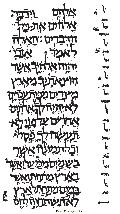
|
Hebrew Pentateuch
|
|
The Hebrew Pentateuch (Exod. XX 1-5) Ninth Century. The text is arranged in three columns to the page and is accompanied by the Massorah Magna and Parva. |
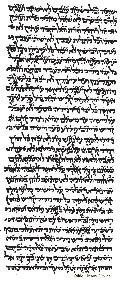
|
Hebrew Pentateuch
|
|
Hebrew Pentateuch (Numbers vi. 3-10) Twelfth Century. The text is accompanied by Chaldee Targum "translation ", translation commonly attributed to Oukelos; the two version being written in alternated verses. |
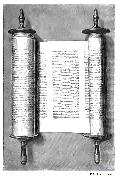
|
The Book of the Law
|
|
The "Book of the Law", fifteenth century. The complete column of the Hebrew text contains the "song of Moses" (Exod. xv 1-19). |
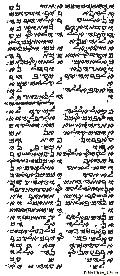
|
Samaritan Pentateuch Arabic
|
|
The manuscript is bilingual, Hindu and Arabic, in Samaritan characters written in parallel double columns. This plate represents the Arabic text. |
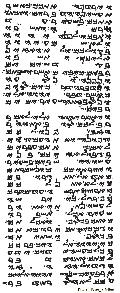
|
Samaritan Pentateuch
|
|
The manuscript is bilingual, Hindu and Arabic, in Samaritan characters written in parallel double columns. This plate represents the Hebrew text. |
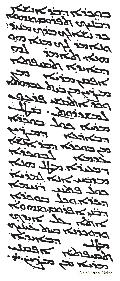
|
Syriac Books of the Pentateuch
|
|
Four books of the Pentateuch, viz, Genesis, Exodus, Numbers and Deutronomy according to the Peshitta version, in the Estrangela-Syrian character. The oldest dated biblical manuscript dated. |

|
Aelfrics Pentateuch
|
|
The Pentateuch and Book of Joshua, partly translated and partly epitomized by Aelfric, Archbishop of Canterbury who died in A.D. 1006. |
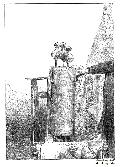
|
The Ancient Case Containing the Samaritan Pentateuch
|
|
The ancient case containing the Samaritan Pentateuch. |
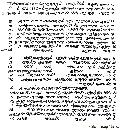
|
Specimen of an Ancient Samaritan Pentateuch
|
|
A specimen of ancient Samaritan pentateuch, which is part of the so-called fire-tried manuscript. |









